AWM41 1072 - [Official History, 1914-18 War: Records of Arthur G Butler:] Interviews containing accounts of Nursing experiences in the AANS [Australian Army Nursing Service]. These nurses were interviewed by Matron Kellett - Part 8
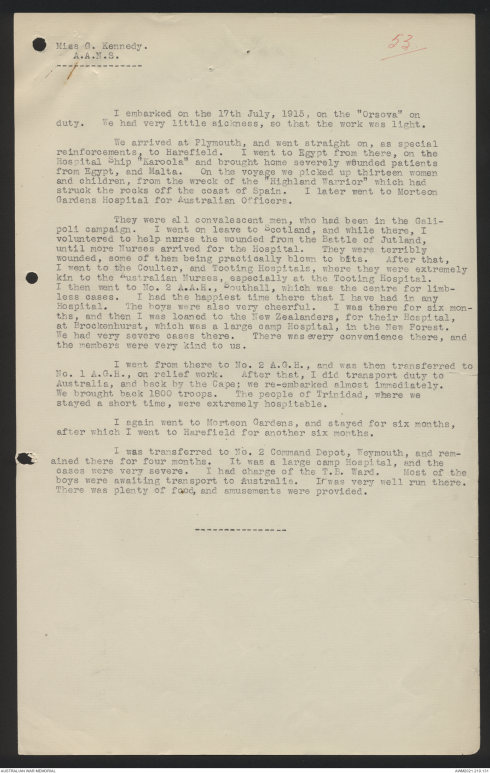
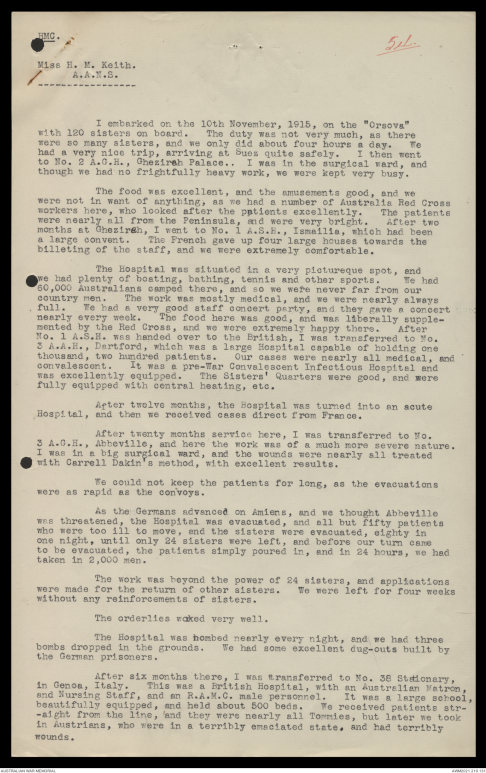
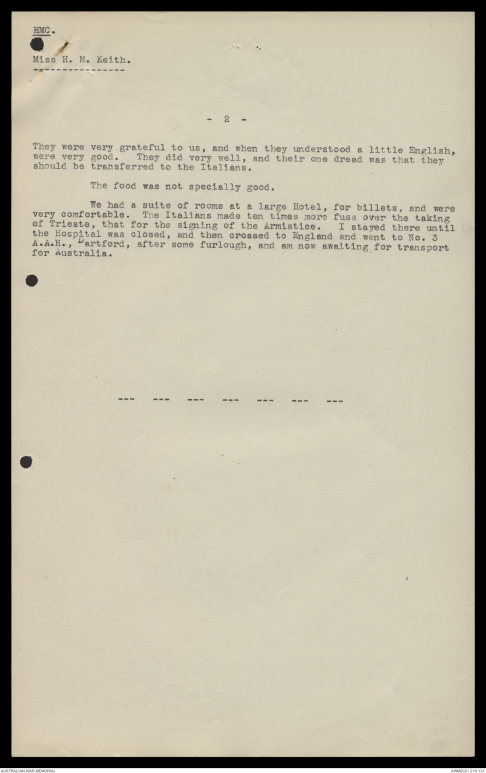
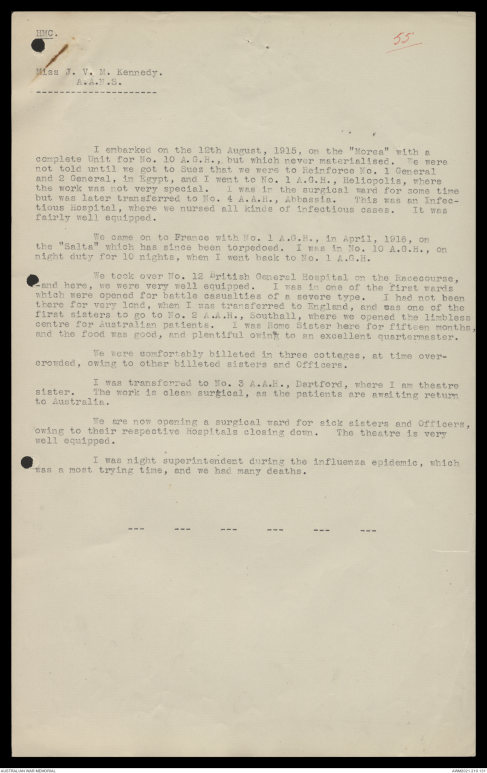
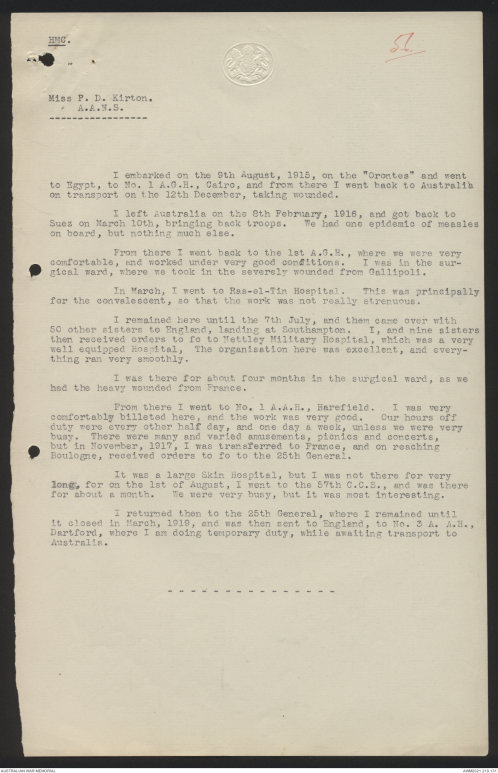
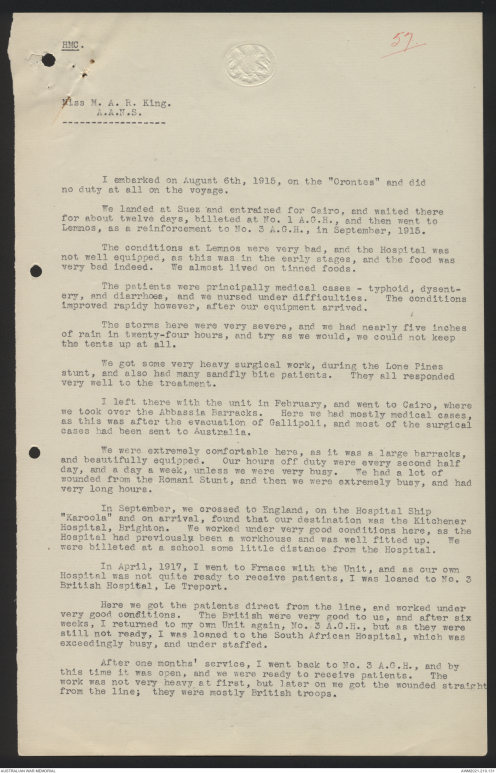
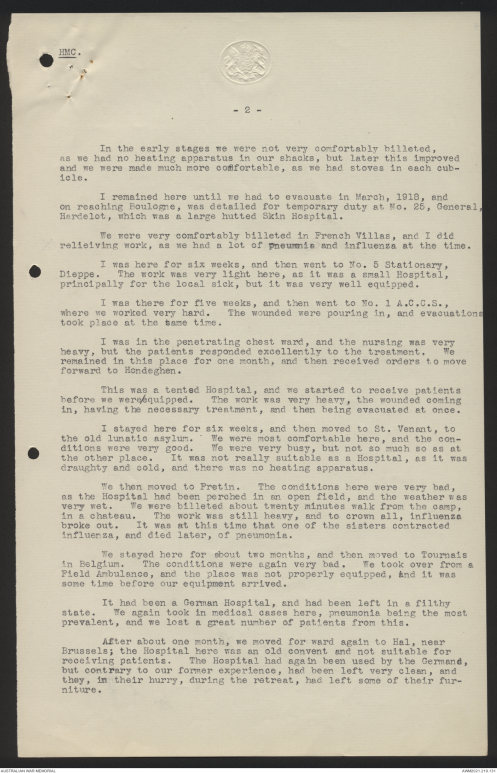
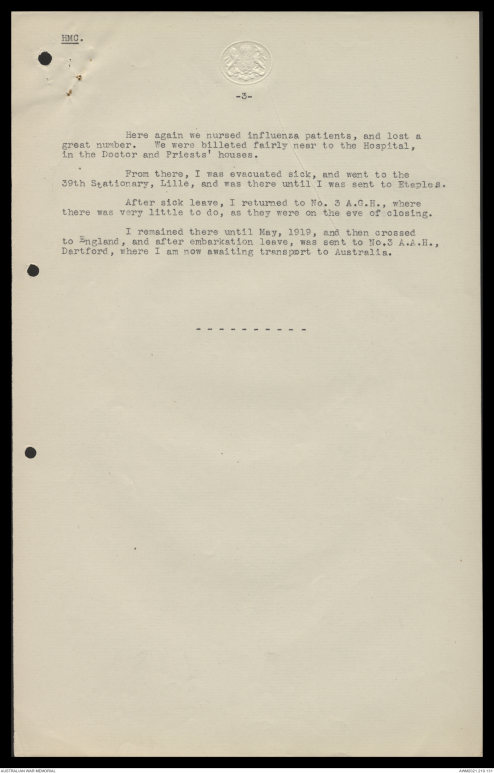
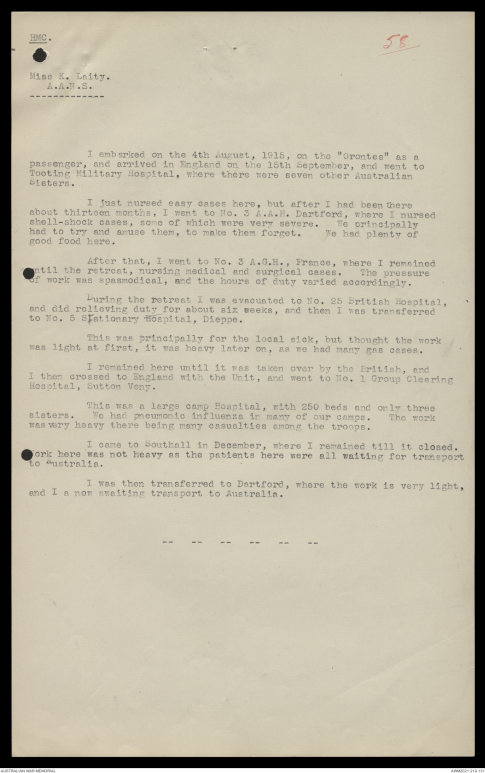
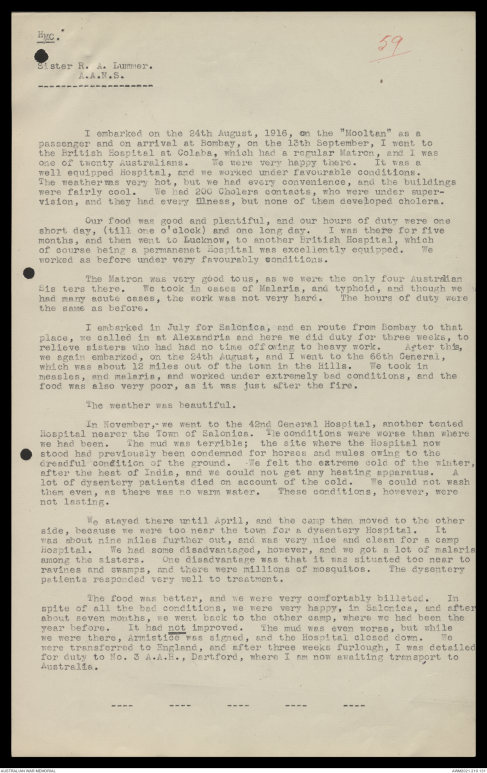
[*53*]
Miss G. Kennedy.
A.A.N.S.
I embarked on the 17th July, 1915, on the "Orsova" on
duty. We had very little sickness, so that the work was light.
We arrived at Plymouth, and went straight on, as special
reinforcements, to Harefield. I went to Egypt from there, on the
Hospital Ship "Karoola" and brought home severely wounded patients
from Egypt, and Malta. On the voyage we picked up thirteen women
and children, from the wreck of the "Highland Warrior" which had
struck the rocks off the coast of Spain. I later went to Moreton
Gardens Hospital for Australian Officers.
They were all convalescent men, who had been in the Gallipoli
campaign. I went on leave to Scotland, and while there, I
voluntered to help nurse the wounded from the Battle of Jutland,
until more Nurses arrived for the Hospital. They were terribly
wounded, some of them being practically blown to bits. After that,
I went to the Coulter, and Tooting Hospitals, where they were extremely
kin to "ustralian Nurses, especially at the Tooting Hospital.
I then went to No. 2 A.A.H., Southall, which was the centre for limbless
cases. I had the happiest time there that I have had in any
Hospital. The boys were also very cheerful. I was there for six months,
and then I was loaned to the New Zealanders, for their Hospital,
at Brockenhurst, which was a large camp Hospital, in the New Forest.
We had very severe cases there. There was every convenience there, and
the members were very kind to us.
I went from there to No. 2 A.G.H., and was then transferred to
No. 1 A.G.H., on relief work. After that, I did transport duty to
Australia, and back by the Cape; we re-embarked almost immediately.
We brought back 1800 troops. The people of Trinidad, where we
stayed a short time, were extremely hospitable.
I again went to Moreton Gardens, and stayed for six months,
after which I went to Harefield for another six months.
I was transferred to No. 2 Command Depot, Weymouth, and remained
there for four months. It was a large camp Hospital, and the
cases were very severe. I had charge of the T.B. Ward. Most of the
boys were awaiting transport to Australia. It was very well run there.
There was plenty of food, and amusements were provided.
[*54*]
HMC.
Miss H.M. Keith.
A.A.N.S.
I embarked on the 10th November, 1915, on the "Orsova"
with 120 sisters on board. The duty was not very much, as there
were so many sisters, and we only did about four hours a day. We
had a very nice trip, arriving at Suez quite safely. I then went
to No. 2 A.G.H., Ghezirah Palace.. I was in the surgical ward, and
though we had no frightfully heavy work, we were kept very busy.
The food was excellent, and the amusements good, and we
were not in want of anything, as we had a number of Australia Red Cross
workers here, who looked after the patients excellently. The patients
were nearly all from the Peninsula, and were very bright. After two
months at Ghezirah, I went to No. 1 A.S.H., Ismailia, which had been
a large convent. The French gave up four large houses towards the
billeting of the staff, and we were extremely comfortable.
The Hospital was situated in a very pictureque spot, and
we had plenty of boating, bathing, tennis and other sports. We had
60,000 Australian camped there, and so we were never far from our
country men. The work was mostly medical, and we were nearly always
full. We had a very good staff concert party, and they gave a concert
nearly every week. The food here was good, and was liberally supplemented
by the Red Cross, and we were extremely happy there. After
No. 1 A.S.H. was handed over to the British, I was transferred to No.
3 A.A.H., Dartford, which was a large Hospital capable of holding one
thousand, two hundred patients. Our cases were nearly all medical, and
convalescent. It was a pre-War Convalescent Infectious Hospital and
was excellently equipped. The Sisters' Quarters were good, and were
fully equipped with central heating, etc.
After twelve months, the Hospital was turned into an acute
Hospital, and then we received cases direct from France.
After twenty months of service here, I was transferred to No.
3 A.G.H., Abbeville, and here the work was much more of a severe nature.
I was in a big surgical ward, and the wounds were nearly all treated
with Carrell Dakin's method, with excellent results.
We could not keep the patients for long, as the evacuations
were as rapid as the convoys.
As the Germans advanced on Amiens, and we thought Abbeville
was threatened, the Hospital was evacuated, and all but fifty patients
who were too ill to move, and the sisters were evacuated, eighty in
one night, until only 24 sisters were left, and before our turn came
to be evacuated, the patients simply poured in, and in 24 hours, we had
taken in 2,000 men.
The work was beyond the power of 24 sisters, and applications were made for the return of other sisters. We were left for four weeks
without any reinforcements of sisters.
The orderlies worked very well.
The Hospital was bombed nearly every night, and we had three
bombs dropped in the grounds. We had some excellent dug-outs built by
the German prisoners.
After six months there, I was transferred to No. 38 Stationary,
in Genoa, Italy. This was a British Hospital, with an Australia Matron,
and Nursing Staff and an R.A.M.C. male personnel. it was a large school,
beautifully equipped, and held about 500 beds. We received patients straight
from the line, and they were all nearly Tommies, but later we took
in Austrians, who were in a terribly emaciated state, and had terribly
wounds.
HMC .
Miss H. M. Keith.
- 2 -
They were very grateful to us, and when they understood a little English,
were very good. They did very well, and their one dread was that they
should be transferred to the Italians.
The food was not specially good.
We had a suite of rooms at a large Hotel, for billets, and were
very comfortable. The Italians made ten times more fuss over the taking
of Trieste, that for the signing of the Armistice. I stayed there until
the Hospital was closed, and then crossed to England and went to No.3
A.A.H., Dartford, after some furlough, and am now awaiting for transport
for Australia.
[*55*]
HMC.
Miss J. V. M. Kennedy.
A.A.N.S.
I embarked on the 12th August. 1915, on the "Morea" with a
complete unit for No. 10 A.G.H., but which never materialised. We were
not told until we got to Suez that we were to reinforce No. 1 General
and No. 2 General, in Egypt, and I went to No. 1 A.G.H., Heliopolis, where
the work was not very special. I was in the surgical ward for some time
but was later transferred to No. 4 A.A.H., Abbassia. This was an Infectious
Hospital, where we nursed all kinds of infectious cases. It was
fairly well equipped.
We came on to France with No. 1 A.G.H., in April, 1916, on
the "Salta" which has since been torpedoed. I was in No. 10 A.G.H., on
night duty for 10 nights, when I went to No. 1 A.G.H.
We took over No. 12 British General Hospital on the Racecourse,
-and here, we were very well equipped. I was in one of the first wards
which were opened for battle casualties of a severe type. I had not been
there for very lond, when I was transferred to England, and was one of the
first sisters to go to No. 2 A.A.H., Southall, where we opened the limbless
centre for Australian patients. I was Home Sister here for fifteen months
and the food was good, and plentiful owing to an excellent quartermaster.
We were comfortably billeted in three cottages, at time overcrowded,
owing to other billeted sisters and Officers.
I was transferred to No. 3 A.A.H., Dartford, where I am theatre
sister. The work is clean surgical, as the patients are awaiting return
to Australia.
We are now opening a surgical ward for sick sisters and Officers,
owing to their respective hospitals closing down. The theatre is very
well equipped.
I was night superintendent during the influenza epidemic, which
was a most trying time, and we had many deaths.
[*56*[
HMC.
Embossed Seal impression - see original document
Miss P. D. Kirton.
A.A.N.S.
I embarked on the 9th August, 1915, on the "Orontes" and went
to Egypt, to No. 1 A.G.H., Cairo, and from there I went back to Australia
on transport on the 12th December, taking wounded.
I left Australia on the 8th February, 1916, and got back to
Suez on March 10th, bringing back troops. We had one epidemic of measles
on board, but nothing much else.
From there I went back to the 1st A.G.H., where we were very
comfortable, and worked under very good conditions. I was in the surgical
ward, where we took in the severely wounded from Gallipoli.
In March, I went to Ras-el-Tin Hospital. This was principally
for the convalescent, so that the work was not really strenuous.
I remained here until the 7th July, and them came over with
50 other sisters to England, landing at Southampton. I, and nine sisters
then received orders to fo to Nettley Military Hospital, which was a very
well equipped Hospital. The organisation here was excellent, and everything
ran very smoothly.
I was there for about four months in the surgical ward, as we
had the heavy wounded from France.
From there I went to No. 1 A.A.H., Harefield. I was very
comfortably billeted here, and the work was very good. Our hours off
duty were every other half day, and one day a week, unless we were very
busy. There were many and varied amusements, picnics and concerts,
but in November, 1917, I was transferred to France, and on reaching
Boulogne, received orders to fo to the 25th General.
It was a large Skin Hospital, but I was not there vary
long, for on the 1st of August, I went to the 57th C.C.S., and was there
for about a month. We were very busy, but it was most interesting.
I returned then to the 25th General, where I remained until
it closed in March, 1919, and was then sent to England, to No. 3 A. A.H.,
Dartford, where I am doing temporary duty, while awaiting transport to
Australia.
[*57*]
HMC.
Embossed Seal impression - see original document
Miss M. A. R. King.
A.A.N.S.
I embarked on August 6th, 1915 on the "Crontes" and did no duty at all on the voyage.
We landed at Suez and entrained for Cairo, and waited there
for about twelve days, billeted at No. 1 A.G.H., and then went to
Lemnos, as a reinforcement to No. 3 A.G.H., in September, 1915.
The conditions at Lemnos were very bad, and the Hospital was
not well equipped, as this was in the early stages, and the food was
very bad indeed. We almost lived on tinned foods.
The patients were principally medical cases - typhoid, dysentery,
and diarrhoea, and we nursed them under difficulties. The conditions
improved rapidly however, after our equipment arrived.
The storms here were very severe, and we had nearly five inches
of rain in twenty-four hours, and try as we would, we could not keep
the tents up at all.
We got some very heavy surgical work, during the Lone Pines
stunt, and also had many sandfly bite patients. They all responded
very well to the treatment.
I left there with the unit in February, and went to Cairo, where
we took over the Abbassia Barracks. Here we had mostly medical cases,
as this was after the evacuation of Gallipoli, and most of the surgical
cases had been sent to Australia.
We were extremely comfortable here, as it was a large barracks,
and beautifully equipped. Our hours of duty were every second half
day, and a day a week, unless we were very busy. We had a lot of
wounded from the Romani Stunt, and then we were extremely busy, and had
very long hours.
In September, we crossed to England, on the Hospital Ship
"Karoola" and on arrival, found that our destination was the Kitchener
Hospital, Brighton. We worked under very good conditions here, as the
Hospital had previously been a workhouse and was well fitted up. We
were billeted at a school some little distance from the Hospital.
In April, 1917, I went to France with the Unit, and as our own
Hospital was not quite ready to receive patients, I was loaned to No. 3
British Hospital, Le Treport.
Here we got the patients direct from the line, and worked under
very good conditions. The British were very good to us, and after six
weeks, I returned to my own unit again, No. 3 A.G.H., but as they were
still not ready, I was loaned to the South African Hospital, which was
exceedingly busy, and under staffed.
After one months' service, I went back to No. 3 A.G.H., and by
this time it was open, and we were ready to receive patients. The
work there was not very heavy at first, but later on we got the wounded straight
from the line; they were mostly British troops.
HMC.
Embossed Seal impression - see original document
- 2 -
In the early stages we were not very comfortably billeted,
as we had no heating apparatus in our shacks, but later this improved
and we were made much more comfortable, as we had stoves in each cubicle.
I remained here until we had to evacuate in March, 1918, and
on reaching Boulogne, was detailed for temporary duty at No. 25, General,
Hardelot, which was a large hutted Skin Hospital.
We were very comfortably billeted in French Villas, and I did
relieiving work, as we had a lot of pneumonia and influenza at the time.
I was here for six weeks, and then went to No. 5 Stationary,
Dieppe. The work was very light here, as it was a small Hospital,
principally for the local sick, but it was very well equipped.
I was there for five weeks, and then went to No. 1 A.C.C.S.,
where we worked very hard. The wounded were pouring in, and evacuations
took place at the same time.
I was in the penetrating chest ward, and the nursing was very
heavy, but the patients responded excellently to the treatment. We
remained in this place for one month, and then received orders to move
forward to Hondeghen.
This was a tented Hospital, and we started to receive patients
before we were/equipped. The work was very heavy, the wounded coming
in, having the necessary treatment, and then being evacuated at once.
I stayed here for six weeks, and then moved to St. Venant, to
the old lunatic asylum. We were most comfortable here, and the conditions
were very good. We were very busy, but not so much so as at
the other place. It was not really suitable as a hospital, as it was
draughty and cold, and there was no heating apparatus.
We then moved to Pretin. The conditions here were very bad,
as the Hospital had been perched in an open field, and the weather was
very wet. We were billeted about twenty minutes walk from the camp,
in a chateau. The work was still heavy, and to crown all, influenza
broke out. It was at this time that one of the sisters contracted
influenza, and died later, of pneumonia.
We stayed here for about two months, and then moved to Tournais
in Belgium. The conditions were again very bad. We took over from a
Field Ambulance, and the place was not properly equipped, and it was
some time before our equipment arrived.
It had been a German Hospital, and had been left in a filthy
state. We again took in medical cases here, pneumonia being the most
prevalent, and we lost a great number of patients from this.
After about one month, we moved forward again to Hal, near
Brussels; the Hospital here was an old convent and not suitable for
receiving patients. The Hospital had again been used by the Germans,
but contrary to our former experience, had been left very clean, and
they, in their hurry, during the retreat, had left some of their furniture.
HMC.
Embossed Seal impression - see original document
- 3 -
Here again we nursed influenza patients, and lost a
great number. We were billeted fairly near to the Hospital,
in the Doctor and Priests' houses.
From there, I was evacuated sick, and went to the
39th Stationary, Lille, and was there until I was sent to Etaples.
After sick leave, I returned to No. 3 A.G.H., where
there was very little to do, as they were on the eve of closing.
I remained there until May, 1919, and then crossed
to England, and after embarkation leave, was sent to No.3 A.A.H.,
Dartford, where I am now awaiting transport to Australia.
[*58*]
HMC.
Miss K. Laity.
A.A.N.S.
I embarked on the 4th August, 1915, on the "Grontes" as a
passenger, and arrived in England on the 15th September, and went to
Tooting Military Hospital, where there were seven other Australian
Sisters.
I just nursed easy cases here, but after I had been there
about thirteen months, I went to No. 3 A.A.H. Dartford, where I nursed
shell-shock cases, some of which were very severe. We principally
had to try and amuse them, to make them forget. We had plenty of
good food here.
After that, I went to No. 3 A.G.H., France, where I remained
until the retreat, nursing medical and surgical cases. The pressure
of work was spasmodical, and the hours of duty varied accordingly.
During the retreat I was evacuated to No. 25 British Hospital,
and did relieving duty for about six weeks, and then I was transferred
to No. 5 Stationary Hospital, Dieppe.
This was principally for the local sick, but thought the work
was light at first, it was heavy later on, as we had many gas cases.
I remained here until it was taken over by the British, and
I then crossed to England with the Unit, and went to No. 1 Group Clearing
Hospital, Sutton Veny.
This was a large camp Hospital, with 250 beds and only three
sisters. We had pneumonic influenza in many of our camps. The work
was very heavy there being many casualties among the troops.
I came to Southall in December, where I remained till it closed.
Work here was not heavy as the patients here were all waiting for transport
to Australia.
I was then transferred to Dartford, where the work is very light,
and I a now awaiting transport to Australia.
[*59*]
HMC.
Sister R. A. Lummer.
A.A.N.S.
I embarked on the 24th August, 1916, on the "Mooltan" as a
passenger and on arrival at Bombay, on the 13th September, I went to
the British Hospital at Colaba, which had a regular Matron, and I was
one of the twenty Australians. We were very happy there. It was
well equipped Hospital, and we worked under favourable conditions.
The weather was very hot, but we had every convenience, and the buildings
were fairly cool. We had 200 Cholera contacts, who were under supervision,
and they had every illness, but none of them developed cholera.
Our food was good and plentiful, and our hours of duty were one
short day, (till one o'clock) and one long day. I was there for five
months, and then went to Lucknow, to another British Hospital, which
of course being a permanenet Hospital was excellently equipped. We
worked as before under very favourably conditions.
The Matron was very good to us, as we were the only four Australian
Sisters there. We took in cases of Malaria, and typhoid, and though we
had many acute cases, the work was not very hard. The hours of duty were
the same as before.
I embarked in July for Salonica, and en route from Bombay to that
place, we called in at Alexandria and here we did duty for three weeks, to
relieve sisters who had had no time off owing to heavy work. After this,
we again embarked, on the 24th August, and I went to the 66th General,
which was about 12 miles out of the town in the Hills. We took in
measles, and malaria, and worked under extremely bad conditions, and the
food was also very poor, as it was just after the fire.
The weather was beautiful.
In November, we went to the 42nd General Hospital, another tented
Hospital nearer the Town of Salonica. The conditions were worse than where
we had been. The mud was terrible; the site where the Hospital now
stood had previously been condemned for horses and mules owing to the
dreadful condition of the ground. We felt the extreme cold of the winter,
after the heat of India, and we could not get any heating apparatus. A
lot of dysentery patients died on account of the cold. We could not wash
them even, as there was no warm water. These conditions, however, were
not lasting.
We stayed there until April, and the camp then moved to the other
side, because we were too near the town for a dysentery Hospital. It
was about nine miles further out, and was very nice and clean for a camp
Hospital. We had some disadvantaged, however, and we got a lot of malaria
among the sisters. One disadvantage was that it was situated too near to
ravines and swamps, and there were millions of mosquitos. The dysentery
patients responded very well to treatment.
The food was better, and we were very comfortably billeted. In
spite of all the bad conditions, we were very happy, in Salonica, and after
about seven months, we went back to the other camp, where we had been the
year before. It had not improved. The mud was even worse, but while
we were there, Armistice was signed, and the Hospital closed down. We
were transferred to England, and after three weeks furlough, I was detailed
for duty to No. 3 A.A.H., Dartford, where I am now awaiting transport to
Australia.
 Sam scott
Sam scottThis transcription item is now locked to you for editing. To release the lock either Save your changes or Cancel.
This lock will be automatically released after 60 minutes of inactivity.